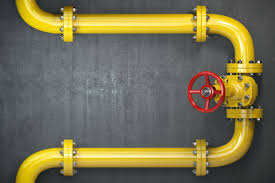What Should You Know Before Installing a New Gas Line?

Setting up a new gas connection can benefit heating, cooking, and hot water, but it involves several important considerations. From planning and regulations to cost and safety, understanding the process can help ensure a smooth installation. This guide covers what to know before adding a gas line, helping you make informed decisions for a safe, efficient setup.
1. Benefits of a Gas Connection
A gas connection provides a reliable, cost-effective energy source. Gas is generally cheaper than electricity for heating and cooking, offering consistent heat for various household needs. Gas appliances are known for efficiency, which can result in energy savings over time.
Why Gas Might Be Right for Your Home
Installing a gas line can improve your home’s energy efficiency, especially if you’re upgrading from electric appliances. Natural gas also has a lower environmental impact than other fossil fuels, making it a practical, budget-friendly energy source that aligns with sustainable living goals.
2. Assessing Your Gas Requirements
Before installation, determine your home’s specific gas requirements. Consider which appliances, such as stoves, water heaters, or central heating systems, will connect to the gas line. This will help you decide on your home’s pipe size and connection type.
FOR MORE INFORMATION CLICK HERE : eid kids gifts
Planning for Efficient Gas Usage
Discuss your gas needs with a licensed fitter who can recommend the right appliance specifications. Planning allows for a smoother installation and prevents potential disruptions later on by ensuring the system meets your household’s energy needs.
3. Compliance with Local Regulations
Gas line installations are subject to strict regulations to ensure safety. Most areas require permits and compliance with building codes, so it’s essential to check local requirements before starting.
Understanding Permits and Inspections
Consult your local council or a licensed installer to learn about the permits and inspections needed for a new gas connection. Many regions mandate inspections to confirm that installations meet safety standards. Addressing these requirements early helps prevent legal issues and ensures a safe, code-compliant setup.
4. Hiring a Licensed Gas Installer
Gas line installation requires specialised skills, making it crucial to hire a licensed professional. A trained gas fitter will follow all necessary safety measures and regulations, ensuring a secure and efficient installation.
Why Professional Expertise Matters
A licensed installer will handle tasks such as selecting the appropriate pipe size, connecting appliances securely, and testing for leaks. This reduces risks and ensures your gas line installation operates safely and effectively. Attempting DIY gas work can be dangerous and may lead to costly repairs, so relying on a professional is essential.
5. Budgeting for Installation Costs
The cost of installing a new gas line can vary depending on factors like pipe length, appliance types, and labour rates. Understanding these costs beforehand helps with effective budgeting.
Breaking Down Expected Expenses
Request a detailed quote from a gas installer that includes the cost of materials, labour, and permits. Knowing the complete cost upfront helps avoid surprises and ensures you can make informed financial decisions. Although gas installations can be an investment, the long-term energy savings often justify the cost.
6. Preparing Your Home for Installation
Before installation day, prepare your home by clearing the areas where gas lines will be laid, such as basements, utility rooms, or exterior spaces. Inform household members about the scheduled work, as some appliances may be temporarily unavailable.
Making Installation Day Run Smoothly
Clearing pathways and ensuring access to installation sites allows professionals to work efficiently. This preparation speeds up the installation and helps avoid delays. Sometimes, your installer may recommend temporarily turning off water or electricity for safety reasons during installation.
7. Post-Installation Safety and Maintenance
After installation, regular maintenance is essential for safe gas line operation. Schedule routine inspections to ensure everything is functioning correctly and be aware of the signs of gas leaks, like unusual smells or hissing sounds near appliances.
Keeping Your Gas Connection Safe
Periodic maintenance by a professional helps catch issues early and maintain safety. Familiarising yourself with basic safety practices, such as knowing how to turn off the gas supply, can protect your household. Installing carbon monoxide detectors adds an extra layer of safety, giving you peace of mind.
In conclusion, installing a new gas connection involves thoughtful planning, professional expertise, and adherence to safety regulations. You can set up a safe, efficient gas system that serves your home well by assessing your gas requirements, complying with local codes, and hiring licensed professionals. A properly installed gas line brings affordable and consistent energy benefits, supporting comfort and savings for years to come.



